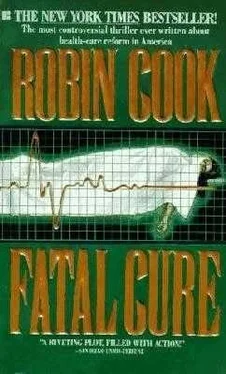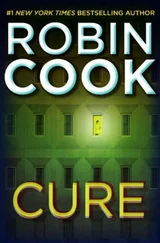WEDNESDAY, OCTOBER 20
Despite Nikki's sustained protests, David and Angela insisted that she stay home from school another day. Considering the weather and the fact that she was still on antibiotics there was no reason to take a chance.
Although Nikki was not as cooperative as usual, they carried out her morning respiratory therapy with great diligence. Both David and Angela listened to her chest afterward and both were satisfied.
Alice Doherty arrived exactly at the time she promised. David and Angela were thankful to have someone so reliable and so conveniently available.
As Angela and David climbed into their blue Volvo, David complained that he'd not been able to ride his bike all week. It wasn't raining as hard as it had been, but the clouds were low and ponderous, and a heavy mist rose out of the saturated earth.
They got to the hospital at seven-thirty. While Angela headed off for the lab, David went up to the patient floor. When he entered John Tarlow's room he was surprised to find drop cloths, stepladders, and an empty bed. Continuing on to the nurses' station he inquired after his patient.
"Mr. Tarlow has been moved to 206," Janet Colburn said.
"How come?" David asked.
"They wanted to paint the room," Janet said. "Maintenance came up and informed us. We let admitting know, and they told us to transfer the patient to 206."
"I think that's inconsiderate," David complained.
"Well, don't blame us," Janet said. "Talk to maintenance."
Feeling irritated for his patient's sake, David took Janet's suggestion and marched down to maintenance. He knocked on the jamb of the maintenance/engineering office. Inside and bent over a desk was a man close to David's age. He was dressed in rumpled, medium-green cotton twill work shirt and pants. His face was textured with a two-day growth of whiskers.
"What?" Van Slyke asked as he looked up from his scheduling book. His voice was flat and his expression was emotionless.
"One of my patients was moved from his room," David said. "I want to know why."
"If you are talking about room 216, it's being painted," Van Slyke said in a monotone.
"It's obvious it's being painted," David said. "What isn't obvious is why it's being painted."
"We have a schedule," Van Slyke said.
"Schedule or no schedule," David said, "I hardly think patients should be inconvenienced, especially patients who are ill, and patients in the hospital are invariably ill."
"Talk to Beaton if you have a problem," Van Slyke said. He went back to his book.
Taken aback by Van Slyke's insolence, David stood stunned in the doorway for a moment. Van Slyke ignored him with ease. David shook his head, then turned to go. On his way back to the patient floor, he was seriously considering taking Van Slyke's advice to discuss the situation with the hospital administrator until he walked into John Tarlow's new room. Suddenly David was presented with a more pressing problem: John Tarlow's condition was worse.
John's diarrhea and vomiting, which initially had been controlled, had returned with a vengeance. On top of that, John was obtunded, and when aroused, apathetic. David could not understand these symptoms since John had been on IVs since his admission and was clearly not dehydrated.
David examined his patient carefully but couldn't find an explanation for the marked change in his clinical state, particularly his depressed mental status. The only thing David could think of was the possibility John could have been overly sensitive to the sleeping medication that David had prescribed as a PRN order, meaning it was to be given if the patient requested it.
Hurrying back to the nurses' station, David pulled John's chart from the rack. He desperately pored over the data that had returned overnight from the lab in an attempt to understand what was going on and to try to decide what to do next. As a result of the run-in with Kelley the day before he was reluctant to request any consults since neither of the two he wanted-oncology and infectious disease-were CMV doctors.
David closed his eyes and rubbed his temples. He did not feel he was making much progress. Unfortunately, a key piece of information was lacking: the results of the stool cultures plated the day before were not yet available. Consequently David still didn't know if he was dealing with a bacteria or not, and if he was, what kind of bacteria it was. On the positive side was the fact that John was still afebrile.
Redirecting his attention to the chart, David ascertained that John had been given the PRN sleeping medication. Thinking that it might have contributed to John's lethargy, David canceled it. He also ordered another stool culture and another blood count. As a final request, he asked for John's temperature to be taken every hour along with the express order for David to be called if it rose above normal.
After completing the last scheduled biopsy, Angela tidied up the small pathology lab in the OR suite, and headed for her office. Her morning had been productive and pleasant; she'd managed to avoid Wadley entirely. Unfortunately, she knew she'd eventually have to see him, and she worried about his behavior. Although she considered herself an optimistic person, she was fearful that the problem with Wadley would not spontaneously resolve.
Entering the office, Angela immediately noticed the connecting door from her office into Wadley's was ajar. As silently as possible she moved over to the door and began to close it.
"Angela!" Wadley called out, making Angela flinch. She hadn't realized how tense she was. "Come in here. I want to show you something fascinating."
Angela sighed and reluctantly opened the door. Wadley was sitting at his desk in front of his regular microscope, not the teaching microscope.
"Come on," Wadley called again. He waved Angela over and tapped the top of his microscope. "Take a gander at this slide."
Warily Angela advanced into the room. Several feet away she hesitated. As if sensing her reluctance, Wadley gave himself a little push, and his chair rolled back from the desk. Angela stepped up to the microscope and leaned over to adjust the eyepieces.
Before she could look in Wadley lunged forward and grabbed her around the waist. He pulled her onto his lap and locked his arms around her.
"Gotcha!" Wadley cried.
Angela shrieked and struggled to get away. The unexpected forcefulness of the contact shocked her. She'd been concerned about him touching her subtly, not manhandling her.
"Let me go!" Angela demanded angrily, trying to unlock his fingers and break his grip.
"Not until you let me tell you something," Wadley said. He was chuckling.
Angela stopped struggling. She had her eyes closed. She was as humiliated as she was furious.
"That's better," Wadley said. "I've got good news. The trip is all set. I even got the tickets already. We're going to the pathology meeting in Miami in November."
Angela opened her eyes. "Wonderful," she said with as much sarcasm as she could muster. "Now let me go!"
Wadley released her and Angela sprang from his lap. But as she pulled away he managed to grab her wrist. "It's going to be fantastic," Wadley said. "The weather will be perfect. It's the best time of year in Miami. We'll be staying on the beach. I got us rooms in the Fontainbleau."
"Let go!" Angela demanded through clenched teeth.
"Hey," Wadley said. He leaned forward and looked at her closely. "Are you mad or something? I'm sorry if I scared you. I just wanted it to be a surprise." He let go of her hand.
Angela was beside herself with anger. Biting her tongue to keep herself from exploding, she dashed into her office. Mortified and demeaned, she slammed the connecting door.
Forcibly she rubbed her face with both hands, trying to regain a modicum of control. She was shaking from the adrenaline coursing through her body. It took her a few minutes to settle down and for her breathing to return to normal. Once it had, she grabbed her coat, and angrily stalked out of her office. At least Wadley's oafishly inappropriate advances had finally spurred her to action.
Читать дальше












